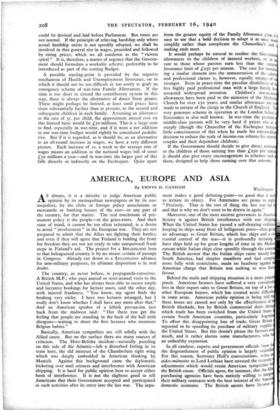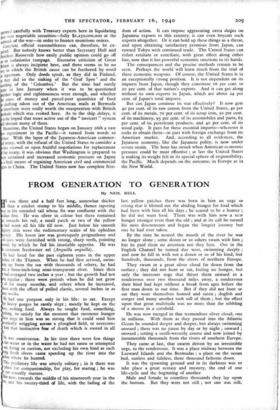AMERICA, EUROPE AND ASIA
By ERWIN D. CANHAM Washington.
AS always, it is a mistake to judge American public opinion by its metropolitan newspapers or by its cos- mopolites, by the clubs or foreign policy associations or mercantile or banking houses of the east—or any part of the country, for that matter. The real touchstone of per- manent policy is the people—at the grass-roots. And their state of mind, it cannot be too often reiterated, is a desire to avoid " involvement " in the European war. They are not prepared to admit that the Allies are fighting their battles, and even if they will agree that Finland is holding the front for freedom they are not yet ready to take unequivocal frank steps in Finland's aid., The project for a $60,000,000 loan to that beleaguered country is by no means certain of passage in Congress. Already cut down to a $20,000,000 advance for non-military purposes, its ultimate disposition is in real doubt.
The country, as never before, is propaganda-conscious. A British M.P., who pays annual or semi-annual visits to the United States, and who has always been able to secure ample and lucrative bookings for lecture tours, said the other day, with injured frankness, " You know, my agent finds the booking very sticky. I have two lectures arranged, but I really don't know whether I shall have any more after that." And an American speaker of a leftish persuasion just back from the midwest said: " Out there you get the feeling that people are standing in the back of the hall with shotguns—waiting to shoot the first lecturer who mentions Belgian babies."
Basically, American sympathies are still solidly with the Allied cause. But on the surface there are many sources of criticism. The Hore-Belisha incident—naturally puzzling on this side of the Atlantic—left a disturbed feeling in its train here, the old mistrust of the Chamberlain right wing which was deeply embedded in American thinking by Munich. Against this background came the diplomatic bickering over mail seizures and interference with American shipping. It is hard for public opinion here to accept either form of interference. It is not the slightest good to tell Americans that their Government accepted and participated in such activities after its entry into the last war. The argu- ment makes a good debating-point—so good that it ten to irritate its object. For Americans are prone to reply " Precisely. That is the sort of thing the last war led t and that is why we don't want to be drawn in again."
Moreover, one of the most ancient grievances in Amen history is against British interference with our shipp When the United States has passed a self-denying ordinan keeping its ships away from all belligerent ports—thus g an advantage to Great Britain, which has ships and a su stantial control of the seas—it is profoundly irritating have ships held up for great lengths of time in the Medit ranean while Italian ships clear speedily through the corm The British answer that the Italian ships came mostly South America, had simpler manifests and had compli more fully with restrictions, made no headway against American charge that Britain was seeking to woo Itali favour.
Behind the mails and shipping situation is a more palpab pinch. American farmers have suffered a very consider loss in their export sales to Great Britain, on top of a loss other European buyers, which has created acute difficult] in some areas. American public opinion is being told these losses are caused not only by the effectiveness of British blockade, but by British commercial deals thin which trade has been switched from the United States certain South American countries, particularly Argo To offset this disappointing loss of trade, Great Britain reported to be speeding its purchase of military supplies the United States. But this doesn't please the farmers ov much, and it rather alarms some manufacturers, who an unhealthy expansion.
In all candour, experts and government officials know the disgruntlement of public opinion is largely unjust& For this reason, Secretary Hull's conversations, notes, aides-memoire to Lord Lothian have stressed the necessity adjustments which would retain American sympathies the British cause. Officials agree, for instance, that the purchasing agencies have been entirely willing to int their military contracts with the best interest of the Amen domestic economy. The British agents have likewise iferated carefully with Treasury experts here in liquidating fir vast negotiable securities—fully $1,25o,000,000 at the 'otbreak of the war—in order to finance munitions orders. complete official reasonableness can, therefore, be ex- Feed. But nobody knows better than Secretary Hull and 'dent Roosevelt how easily . public opinion could go off an isolationist rampage. Excessive criticism of Great .rain is always incipient here, and there seems to be no y in which the British' cause can be furthered by word argument. Only deeds speak, as they did in Finland, they did in the sinking of the ' Graf Spee ' and the 'ding of the ' Columbus.' But the time had surely in late January when it was to be questioned r logic and righteousness were enough, and whether sums of money and parcel-post quantities of food clothing taken out of the American mails at Bermuda elsewhere were really worth the exasperation with British ods which was evoked here. As to the ship delays, it to be hoped that more active use of the " navicert " system obviate many of them.
Meantime, the United States began on January 26th a vast experiment in the Pacific—it turned from words to eace. With the lapse of the Japanese-American commer- treaty, with the refusal of the United States to consider a us vivendi or open fruitful negotiations for replacement the treaty, it was obvious that Washington is prepared to n sustained and increased economic pressure on Japan a final means of regaining American civil and commercial hts in China. The United States now has complete free- dom of action. It can impose aggravating extra duties on Japanese exports to this country, it can even boycott such exports altogether. Or it can hold up these things as a threat, and upon obtaining satisfactory promises from Japan, can reward Tokyo with continued trade. The United States can either retaliate or conciliate, with great effect along either line, now that it has powerful economic sanctions in its hands.
The consequences and the precise methods remain to be seen. Perhaps the world will learn much from the trial of these economic weapons. Of course, the United States is in an exceptionally strong position. It is not dependent on its imports from Japan, though they constitute i6 per cent. to 20 per cent. of that nation's exports. And it can get along without its own exports to Japan, which are about 24 per cent. of Japan's total imports.
But can Japan continue its war effectively? It now gets 4o per cent. of its raw cotton from the United States, 4o per cent. of its metals, 70 per cent. of its scrap iron, 5o per cent. of its machinery, 95 per cent. of its automobiles and parts, 65 per cent. of its petroleum products, and 40 per cent. of its wood pulp. It pays for these essential imports—wherever it seeks to obtain them—in part with foreign exchange from its American market. And, according. to all evidences, the Japanese economy, like the Japanese polity, is now under severe strain. The hour has struck when American economic pressure could be most effective ; at last the United States is making its weight felt in its special sphere of responsibility, the Pacific. Much depends on the outcome, in Europe as in the New World.







































 Previous page
Previous page